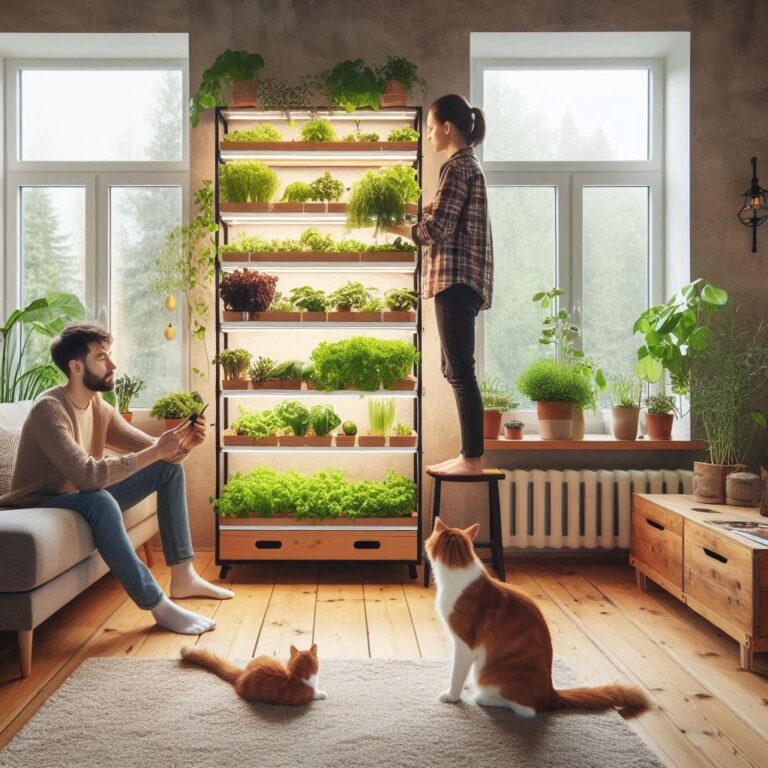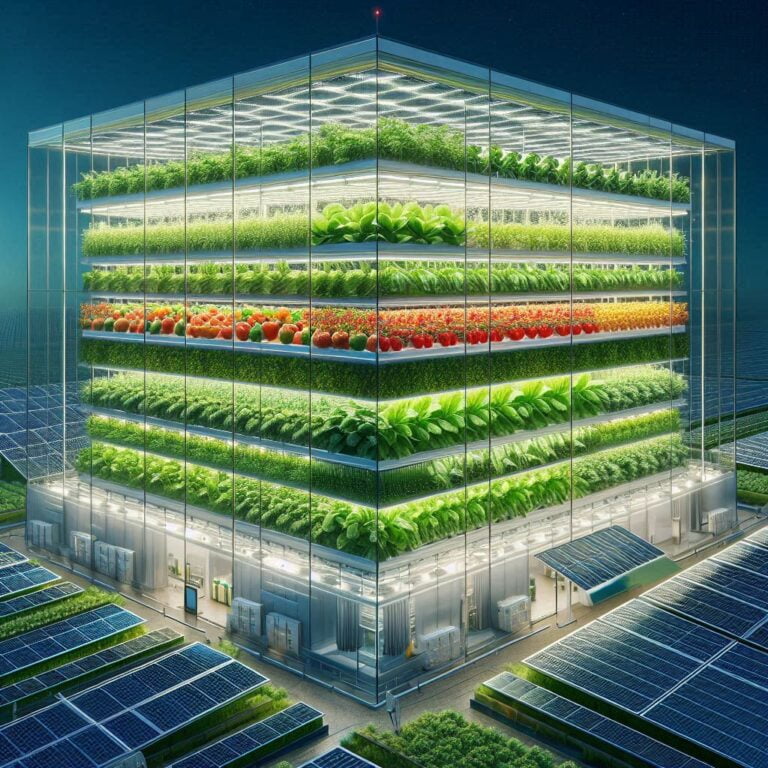Introduction to the Zero Waste Lifestyle
“By the year 2050, the oceans may hold more plastic than fish, measured by weight.”
This alarming prediction by the Ellen MacArthur Foundation isn’t just a wake-up call—it’s a crisis demanding immediate action. As landfills overflow, microplastics infiltrate our food chain, and carbon emissions rise, millions of people are rethinking their habits. One powerful, practical, and planet-friendly solution is the zero waste lifestyle.
What is Zero Waste Lifestyle?
The zero waste lifestyle is a philosophy and practical approach aimed at minimizing the amount of trash sent to landfills and incinerators. Instead of the traditional “take, make, dispose” model, it promotes a circular system where materials are reused, composted, or recycled in a way that mimics nature’s efficiency.
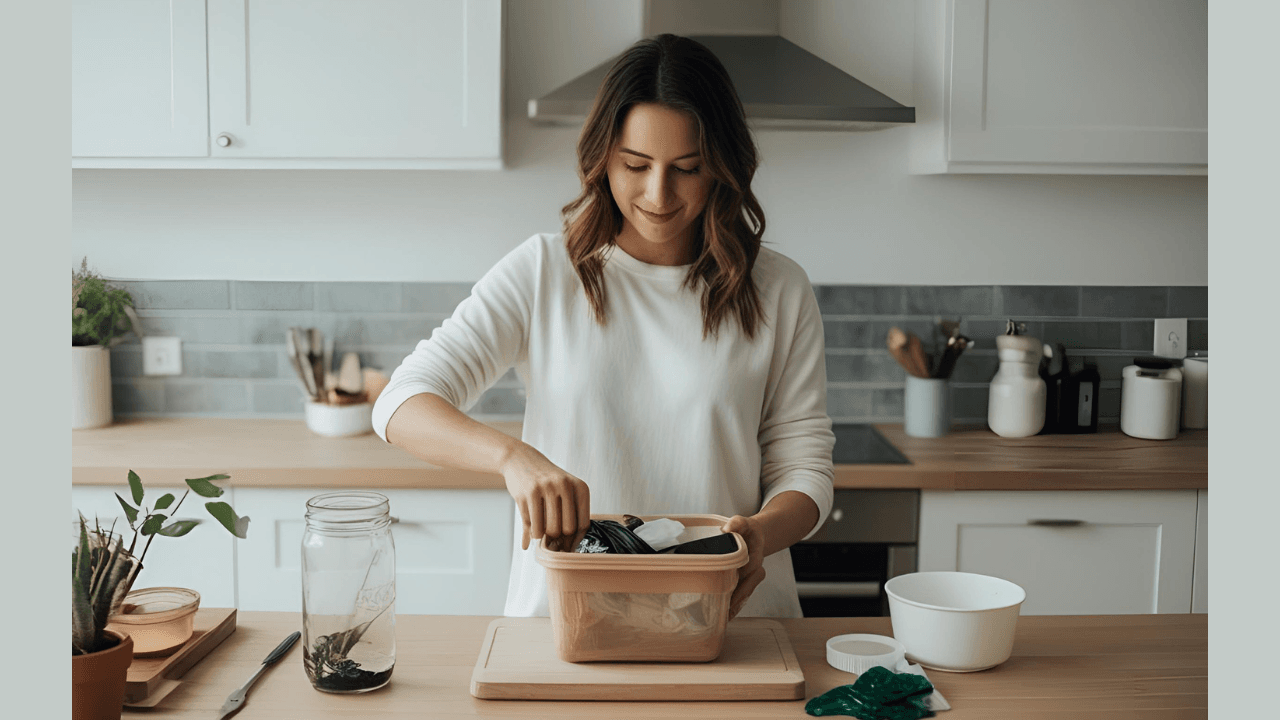
Put simply, when you ask what is zero waste lifestyle, it’s about rethinking our relationship with resources: buying less, wasting nothing, and designing our lives with sustainability in mind. From avoiding single-use plastics to composting food scraps, every small decision adds up to create a meaningful impact.
A Brief History of the Zero Waste Movement
The zero waste lifestyle began gaining traction in the early 2000s, but its roots stretch back further. Influenced by industrial ecology, indigenous practices of waste minimization, and the 1970s environmental movement, it was popularized globally by pioneers like Bea Johnson—author of Zero Waste Home—who famously reduced her family’s yearly waste to a single mason jar.
Today, fueled by growing climate anxiety, social media awareness, and eco-conscious brands, the movement has evolved from a niche trend into a global revolution. Urban zero waste stores, community composting hubs, and sustainable product startups are rapidly transforming how we live and consume.
Why Embrace the Zero Waste Lifestyle?
Adopting a zero waste lifestyle benefits not just the planet but also individuals. It helps:
- Reduce your carbon footprint by lowering demand for resource-heavy manufacturing.
- Save money by promoting mindful consumption and reusable alternatives.
- Improve health by reducing exposure to toxins in packaged and processed goods.
- Empower communities through shared solutions like tool libraries, refill stations, and local markets.
The shift may start small—bringing your own bag, saying no to straws—but it creates a ripple effect. By understanding what is zero waste lifestyle and taking action, you become part of a collective effort to design a cleaner, healthier, and more resilient world.
The Principles of Zero Waste Living: The 5 R’s
Living zero waste starts with one key principle: the 5 R’s. These guiding principles help individuals transition from a throwaway culture to low waste living—a more mindful, resource-conscious way of life that benefits both people and the planet.
Let’s break down each R and explore how you can apply them starting today.
Refuse to Waste – Say No with Purpose
The first step in the zero waste lifestyle is learning to say no—to plastic cutlery, promotional freebies, receipts, or even junk mail.
Example: Politely decline a free T-shirt at an event if you’ll never wear it. That “free” item comes at a real environmental cost.
Beginner Tip: Create a mental checklist for your day. Question yourself: “Will this add value, or am I just adding to the landfill?”
Reduce – Own and Use Less, Intentionally
After refusing the unnecessary, reduce what you do need. This doesn’t mean living without—it means living with purpose.
Example: Instead of buying five trendy tops, invest in two high-quality, timeless pieces that last longer.
Beginner Tip: Try a 30-day minimalist challenge. Remove one item from your home each day that you don’t use or love.
This step is the gateway to low waste living—it helps cut back on clutter, reduces your carbon footprint, and saves money.
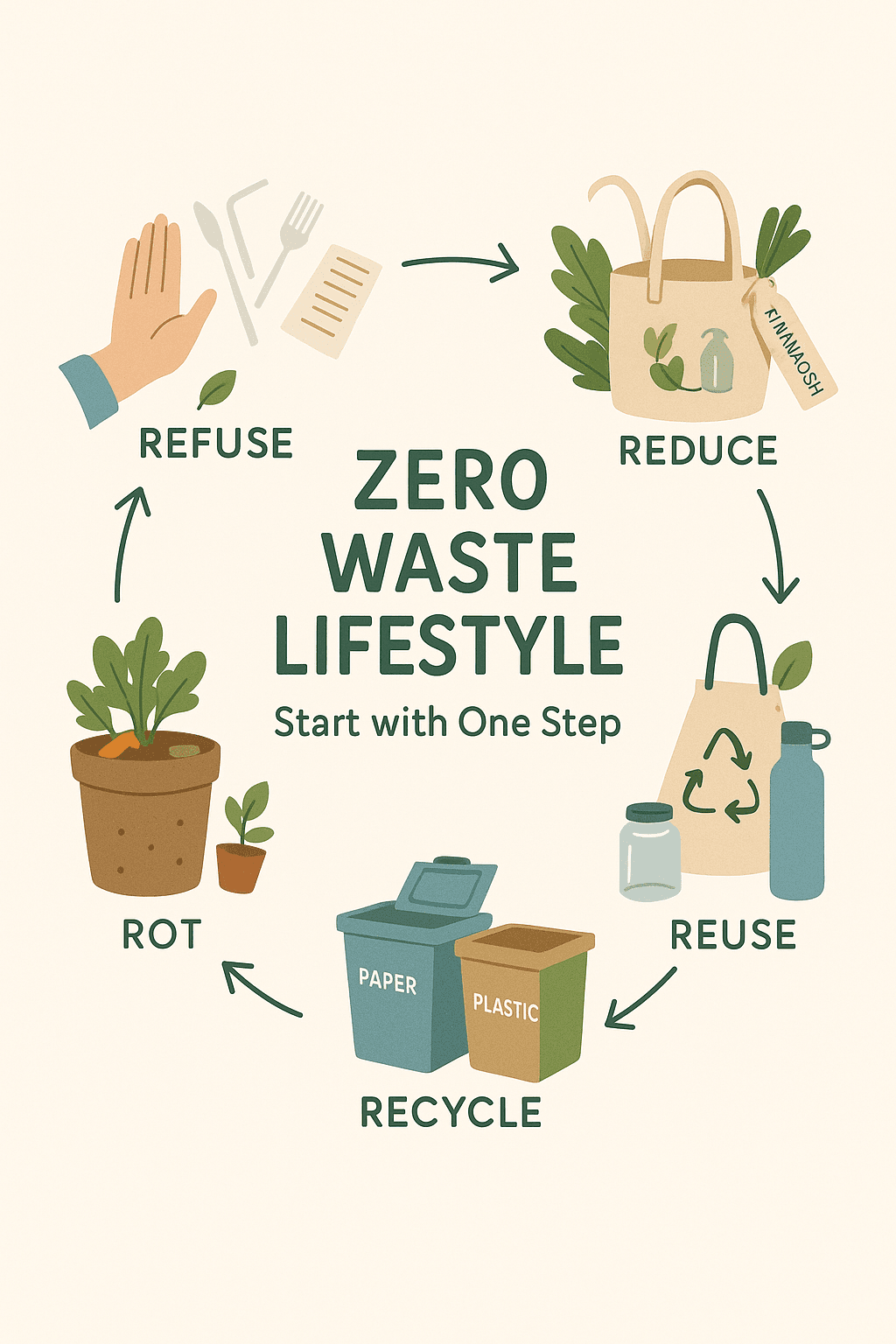
Reuse – Swap Single-Use for Long-Term Solutions
Choose reusables over disposables whenever possible. This simple switch is one of the most effective strategies in the zero waste lifestyle.
Example: Replace plastic water bottles with a stainless-steel bottle, or use cloth napkins instead of paper ones.
Beginner Tip: Start a “reusables kit” with essentials like a tote bag, coffee cup, utensils, and food container for when you’re on the go.
Recycle – As a Last Resort, Not the First
Recycling is important—but it’s not a cure-all. Many items labeled “recyclable” never actually get recycled due to contamination or lack of infrastructure. This is why recycling is the fourth option—not the first—in the waste hierarchy.
Example: Learn your local recycling rules. Not all plastics or paper products are treated equally.
Beginner Tip: Clean containers before placing them in the recycling bin to prevent rejection at the sorting facility.
Rot – Compost Organic Waste
Composting is nature’s way of recycling—and a game-changer for low waste living. Leftover food, used coffee grounds, garden waste, and shredded paper all have the potential to become valuable compost.
Example: Banana peels, vegetable scraps, and eggshells can go into a countertop compost bin or local community garden.
Beginner Tip: Don’t have a backyard? Many urban areas now offer curbside composting or drop-off locations.
By applying the 5 R’s, the zero waste lifestyle becomes not just a concept but a daily practice—one that simplifies your life while supporting the planet. Whether you’re just starting or deep into your journey of low waste living, each “R” is a reminder that meaningful change starts with mindful choices.
Zero Waste Lifestyle Benefits: Why It Matters
Shifting toward a zero waste lifestyle isn’t just an environmental choice—it’s a complete rethinking of how we live, spend, and interact with the world around us. Below, we explore in depth the personal and global benefits of zero waste living, from environmental preservation to better health and long-term financial savings.
🌿 Environmental Benefits: Transforming the Planet Through Small Sustainable Habits
- Reduces Landfill Waste
Every year, the average person produces nearly 1,800 pounds of trash. Most of this ends up in landfills or is incinerated, releasing methane and other harmful greenhouse gases. A zero waste lifestyle drastically reduces this load by focusing on reusables, composting, and mindful consumption. - Protects Oceans and Marine Life
According to the Pew Charitable Trusts, by 2050, plastic in the ocean could outweigh fish if current trends continue. Embracing low waste living cuts single-use plastics and packaging, reducing pollution that endangers marine ecosystems. - Conserves Natural Resources
By reusing and repurposing instead of constantly buying new, we reduce the demand for raw materials like timber, minerals, and fossil fuels—preserving ecosystems and biodiversity in the process. - Lowers Carbon Emissions
A zero waste lifestyle means fewer products being manufactured, transported, and discarded. This helps reduce your overall carbon footprint and plays a direct role in fighting climate change.
🗨️ “Zero waste isn’t about perfection. It’s about making better choices every day.”
— Bea Johnson, Author of Zero Waste Home
💰 Economic Benefits: Save More While Consuming Less
- Cut Monthly Expenses
Switching to reusables like cloth napkins, menstrual cups, and metal razors means fewer trips to the store and less money spent on disposables. These changes pay off within months. - Buy in Bulk and Save
Buying grains, spices, and liquids in bulk (with your own containers) often comes at a lower price per unit and eliminates packaging costs. - Sell or Swap, Don’t Toss
A low waste lifestyle encourages circular economy practices: selling, donating, or swapping items rather than throwing them away. This gives your belongings more life—and may bring in extra income. - DIY Products Are Cheaper and Cleaner
Homemade toothpaste, cleaning products, and snacks cost less than branded items and often contain fewer harmful chemicals. - Invest in Quality
Rather than fast fashion or cheap electronics, zero waste living promotes investing in long-lasting, quality goods—which ultimately reduces waste and repeated spending.
🗨️ “Minimalism isn’t about owning less—it’s about creating space for what truly matters.”
— Joshua Becker, Minimalist & Author
🧘 Health Benefits: Cleaner Habits, Healthier Life
- Lower Exposure to Toxins
Single-use plastics often contain BPA, phthalates, and microplastics—linked to hormonal disruption and long-term health issues. Living a zero waste lifestyle helps reduce contact with harmful chemicals. - Healthier Diet Choices
Buying whole foods in bulk—like legumes, nuts, and grains—steers people away from overly processed and packaged foods. Many zero wasters also shop at farmers markets or local organic stores, improving nutritional quality. - Improved Mental Health Through Simplicity
Reducing clutter fosters a clearer mind, a sense of calm, and more purposeful living. Reducing physical waste often translates into reduced mental overwhelm. - Physical Activity Increases
Choosing to walk, bike, or repair items instead of driving or buying new contributes to a more active lifestyle, which has clear health benefits.
🗨️ “Sustainable living is better for our bodies, minds, and communities.”
— Dr. Jane Goodall, Primatologist & Environmentalist
🌱 Societal and Ethical Benefits: Inspiring Change
- Supports Local and Ethical Businesses
Many eco-conscious consumers shift toward local, ethical, and package-free shops, boosting local economies and encouraging better corporate practices. - Builds Community
Zero waste living often connects individuals through repair cafés, composting groups, clothing swaps, and community gardens—fostering a stronger sense of community. - Raises Awareness
By adopting and sharing your low waste lifestyle journey, you inspire others and contribute to a global culture shift—where waste is the exception, not the norm.
The zero waste lifestyle benefits you, your family, your wallet, and the planet. Whether you’re starting with reusable bags or embracing composting, every step in low waste living moves us closer to a healthier, cleaner, and more equitable world.
Practical Guide to Transitioning into Low Waste Living
Objective: Provide clear, doable actions to help readers start their zero waste journey today—without guilt, overwhelm, or needing a complete lifestyle overhaul.
🌿 Why Start Small?
Embracing a zero waste lifestyle doesn’t mean going trash-free overnight. Instead, it’s about taking small, intentional steps that align with your life. Whether you’re a student, a parent, or a professional, low waste living can be adapted to fit your routine.
🏡 Kitchen Swaps & Habits
The kitchen is often the biggest source of waste—packaging, food waste, single-use plastic. Here’s how to fix that:
Switch to Reusable Food Storage
Instead of plastic wrap or disposable containers, use:
✅ Beeswax wraps
✅ Silicone stretch lids
✅ Glass jars (reused or thrifted)
Recommended Brands: Bee’s Wrap, Stasher Bags
Compost Your Food Scraps
Start with a simple countertop compost bin.
You can compost:
- Fruit & veggie scraps
- Coffee grounds
- Eggshells
Tools to Try: Bamboozle Compost Bin, Lomi Smart Composter
Buy in Bulk Using Your Own Containers
Take jars or cloth bags to bulk food stores. Look for:
- Grains
- Spices
- Legumes
This cuts down massively on packaging.
🛁 Bathroom Swaps
Personal care products are often plastic-heavy and toxin-laden. These swaps are easy and effective.
Use a Bamboo Toothbrush
Replace your plastic toothbrush with an eco-friendly bamboo alternative.
Try: The Humble Co., Brush with Bamboo
Switch to Shampoo Bars & Bar Soaps
They last longer and come package-free.
Top Picks: Ethique, HiBAR, Lush
DIY or Low-Waste Toiletries
Try making your own deodorant or toothpaste—or buy from low-waste brands.
Look for refillable deodorants like Wild or Myro.
🛍️ Shopping & Clothing
Mindful shopping habits reduce waste before it enters your home.
Carry Reusables Everywhere
Essential zero waste kit:
- Cloth tote bag
- Stainless steel water bottle
- Bamboo cutlery
- Collapsible coffee cup
Best All-in-One Kits: Zero Waste Store, Package Free Shop
Buy Less, Choose Better
Embrace mindful consumption:
- Buy secondhand when possible
- Choose high-quality, long-lasting clothing
- Avoid fast fashion
Eco-Friendly Fashion Brands: Patagonia, Pact, Vetta
✈️ Travel & On-the-Go
Low waste living doesn’t stop when you leave home.
Pack a Zero Waste Travel Kit
For daily commutes or vacations, carry:
- A reusable snack container
- Cloth napkin
- Small waste pouch (for compost or recyclables)
Great Kits: Final Co. Travel Set, EarthHero Essentials
Use Refill Stations & Sustainable Hotels
Check apps like RefillMyBottle or Tap to find water refill stations.
Support hotels with eco-certifications or refillable amenities.
📱 Recommended Apps & Tools
Use tech to your zero waste advantage.
| Tool/App | Purpose |
|---|---|
| Too Good To Go | Rescue surplus food from restaurants and bakeries |
| OLIO | Share or find free food and items in your area |
| Refill | Find water refill stations nearby |
| DoneGood | Ethical shopping made easy |
| Good On You | Rates fashion brands on sustainability and ethics |
Adopting a zero waste lifestyle isn’t about doing everything perfectly—it’s about making better choices one day, one product, one habit at a time. Low waste living is achievable for everyone, and every small shift creates ripples of change for our planet and future generations.
🗨️ “Start where you are. Use what you have. Do what you can.”
Understanding Zero Waste Management
Objective: Expand the reader’s view from personal actions to the systemic infrastructure behind a truly waste-free world. This establishes context, credibility, and a sense of scale.
♻️ What is Zero Waste Management?
Zero waste management refers to a systemic approach to waste that prioritizes prevention, resource recovery, and the complete elimination of landfill or incineration. It’s about rethinking how resources flow through society—from production to disposal—and designing waste out of the equation entirely.
Core Goals:
- 100% resource recovery
- Closed-loop systems where materials continuously circulate
- Elimination of landfills and incinerators
- Collaboration between consumers, producers, and governments
📘 The Zero Waste International Alliance (ZWIA) defines zero waste as “the design and management of products and processes to avoid and eliminate the volume and toxicity of waste and materials in a systematic way.”
🌍 Industrial & Municipal Applications
Zero waste is no longer just an individual movement—it’s being adopted by cities, corporations, and countries around the world.
🚛 Municipal Initiatives
- San Francisco has committed to Zero Waste by 2030 and already diverts over 80% of its waste from landfills.
- Kamikatsu, Japan is a small town that segregates waste into 45 categories and recycles nearly everything. Residents take personal responsibility and there’s no central garbage collection.
- Capannori, Italy was the first European municipality to adopt a zero waste goal and inspired over 200 others to follow.
🏭 Industrial Models
- Circular manufacturing: Companies like Patagonia and IKEA design products for reuse and repair.
- Waste-to-energy vs. Zero Waste: While some cities burn waste for energy, zero waste advocates promote true recovery over incineration.
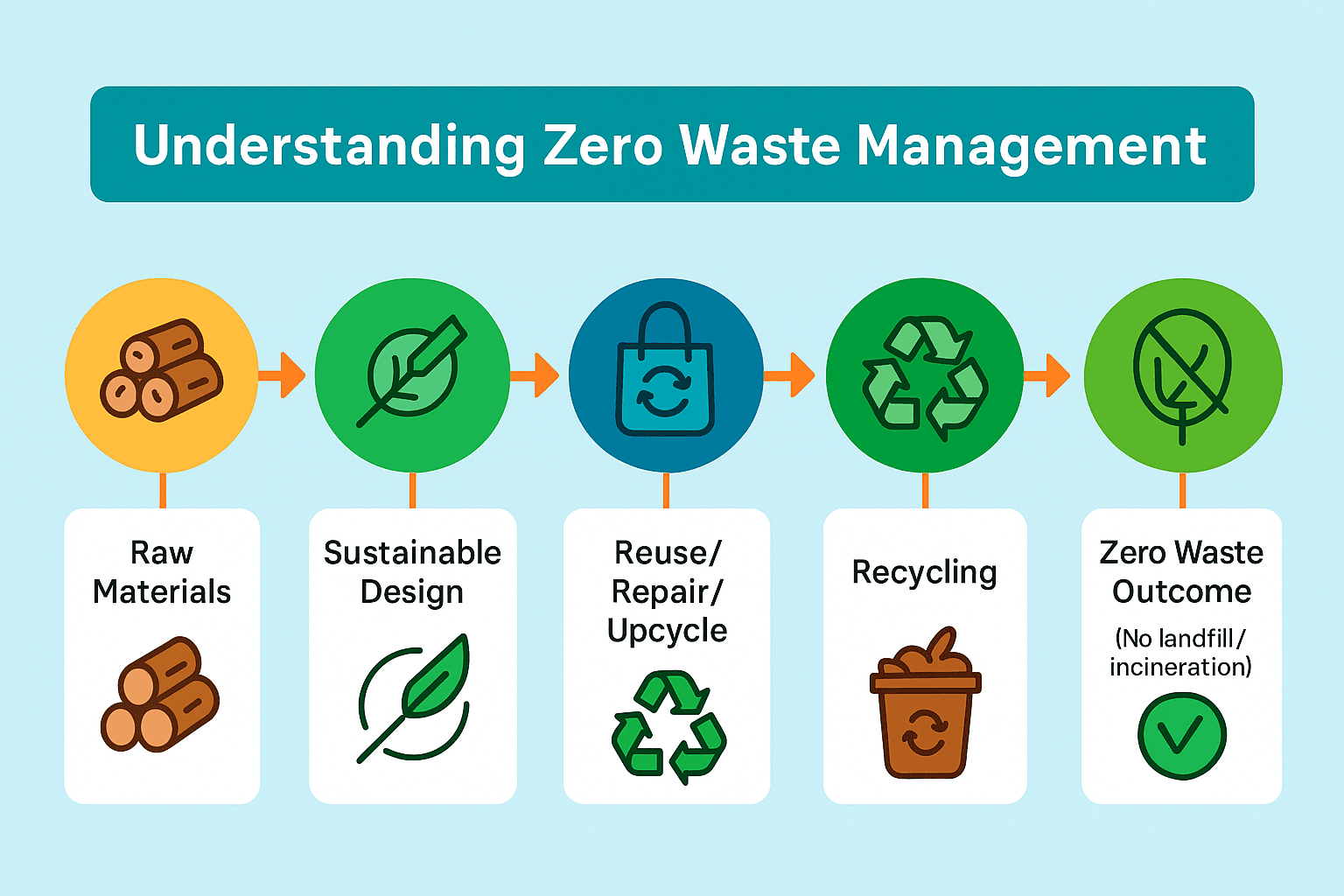
📚 Government & NGO Sources for Reference
- Zero Waste International Alliance (ZWIA)
- Ellen MacArthur Foundation
- U.S. EPA Zero Waste Hierarchy
- Greenpeace Zero Waste Cities
Challenges and How to Overcome Them
Objective: Acknowledge that transitioning to a zero waste lifestyle isn’t always easy—and empower readers with solutions, not guilt.
🚧 Common Barriers in the Zero Waste Journey
Transitioning to a zero waste lifestyle can feel overwhelming, especially when modern systems aren’t built for sustainability. Here are some common challenges faced by beginners and seasoned practitioners alike:
Lack of Bulk Stores or Refill Stations
Problem: Not everyone has access to zero-waste grocery stores or package-free goods.
Solution:
- Opt for items in recyclable glass jars or cardboard packaging.
- Buy in bulk online through zero-waste delivery brands like Zero Waste Store or EarthHero.
- Organize community swaps to share surplus items locally.
Time Constraints
Problem: Homemade toothpaste or bulk shopping can feel like extra work.
Solution:
- Start small: swap one item at a time (e.g., replace paper towels with cloth).
- Use apps like Too Good To Go or Olio to save time and reduce food waste.
- Batch cook, meal plan, and keep your zero waste kit ready (reusable bag, bottle, cutlery).
Social Pressure & Judgment
Problem: Friends, family, or coworkers might question or misunderstand your decision to live a zero waste lifestyle.
Solution:
- Lead by example, not lecture.
- Offer practical swaps to curious friends (like a bamboo toothbrush or beeswax wrap).
- Join online communities like r/ZeroWaste on Reddit or local Facebook groups for support.
Cost Myths
Problem: There’s a belief that zero waste = expensive.
Solution:
- Most sustainable swaps save money in the long run (e.g., menstrual cups, reusable razors).
- Thrift stores and DIY solutions make the lifestyle affordable.
Keep in mind: the most sustainable item is the one you already have.
💬 Real Voices: Lessons from Zero-Waste Practitioners
🗣️ “At first, I was stressed about being ‘perfectly’ zero waste. Now I focus on progress, not perfection. My trash jar isn’t Instagram-perfect—but my impact is real.”
– Priya K., Mumbai-based zero waste coach
🗣️ “I couldn’t find any bulk stores nearby, so I started a neighborhood co-op to buy grains and lentils in 25kg sacks and share them.”
– Jenna M., San Diego
Incorporate these real stories (or your own voice) in quotes, pullouts, or callout boxes to boost emotional connection and Google Discover appeal.
Conclusion: A Call to Sustainable Action
Objective: Leave readers empowered, inspired, and ready to take action. Reinforce that sustainability starts with a single choice.
🌱 Zero Waste is a Lifestyle of Empowerment
You’ve now explored the core of the zero waste lifestyle—its philosophy, benefits, how to start, and how to overcome challenges. The shift isn’t about perfection. It’s about progress, intention, and daily impact.
✅ Recap of Key Benefits:
- 🌍 Environmental Impact: Less pollution, less plastic, more biodiversity.
- 💸 Economic Benefits: Save money through reusables and mindful buying.
- 🧘 Health Improvements: Cleaner products, less toxins, more natural living.
Will you be part of the pollution—or part of the solution?
Encourage readers to share the blog, join your newsletter, or download your free zero waste lifestyle poster as their first step.
Explore More on Sustainable Living:




